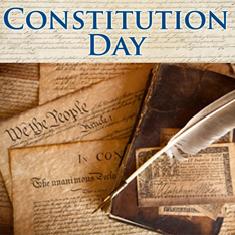When I entered Congress, I swore an oath to support and defend the Constitution, and I have followed through on that promise. The political elites of both parties don’t like what I’m doing. They have a vision of government that is very different from the vision laid out in the Constitution. As the elites see it, the American people are their subjects, and a benevolent privileged few—standing above the law—must watch over the rest of society.
History and logic show us that no matter how “good” the leaders are, unrestrained government invites corruption and cronyism. On the whole, government power always benefits the wealthy and well-connected at the expense of others. Some of the reasons are just common sense. It costs a lot of money to lobby Washington. Even the best-intentioned government official cannot sort out what’s right when he spends most of his time hobnobbing with one percent of society.
Wherever government power has proliferated, societies have become poorer, crueler, and less productive. The extreme examples are found in Communist states, but we need not look that far. Europe is wracked by economic chaos and civil strife because decades of big government bred dependence, resentment, and division among its peoples. In my own state of Michigan, bankrupt Detroit is a victim of the corruption and failed incentives that accompany too much government.
Those who favor more government power face an uncomfortable truth: the Constitution is a libertarian document, and we in government are sworn to uphold it. Under the Constitution, the federal government’s sole purpose is to protect our liberty, not provide us things. The government protects liberty by defending the nation from foreign attack, maintaining open trade among the states and foreign nations, and pursuing a few other limited functions.
This limited role for the federal government takes courage to embrace. It is easier to keep providing things—using other people’s money and incurring large debts. But that is not what the Constitution allows, and it is not what works. Providing things, where necessary, is for local governments, religious institutions, charities, families, and friends.
Living as subjects of King George and fighting a revolutionary war made our Founders wise beyond their time. The Founders preserved local control for almost everything because it would allow competition among the states, because the people would be closer to their elected officials and could more easily toss them out, and because in the worst case scenario a person could leave his city or state in search of better government, but could not easily leave his country.
For those who do not agree with this system, there is a method to amend the Constitution. It is not an easy method because the Constitution exists to prevent power consolidation and restrain extremism at the federal level. And that, too, is an uncomfortable fact for Washington politicians who enjoy the privileges of power and consider themselves judge and jury over what is best for all Americans.
The Founders also understood that the people’s God-given rights are paramount, and that a dangerous world does not make those rights less important, but rather more important, because government officials are always tempted to use dangerous times as a justification for spying on us and violating our freedoms. And, indeed, we see that happening today, even as many of my colleagues and I, backed by millions of patriotic Americans, are fighting to stop it.
In the Internet era, there is more hope for freedom than ever before. While some in government see the Internet as a way to monitor the people and illegally sidestep the Fourth Amendment, I use the Internet to keep government accountable to the people, as the Constitution demands.
Since entering Congress in 2011, I have used Facebook to explain every vote I take on the House floor—more than 2,000—and I have never missed a vote. It is a small gesture that has had amazing consequences, opening up government to greater scrutiny and forcing my colleagues to think twice before casting a vote that ignores the basic principles of the Constitution.
Fortunately, I am not alone in my efforts to preserve our constitutional republic. In both the House and Senate, a new generation of representatives—some younger, some older—are taking up the cause of liberty. It is a cause without partisan labels. It is the constitutional foundation on which we Americans have built the most free and prosperous nation in history.
. . . . . . . . . . . . . . . .
Justin Amash serves as U.S. Representative for Michigan’s 3rd congressional district. This article was published in the American Conservative.
